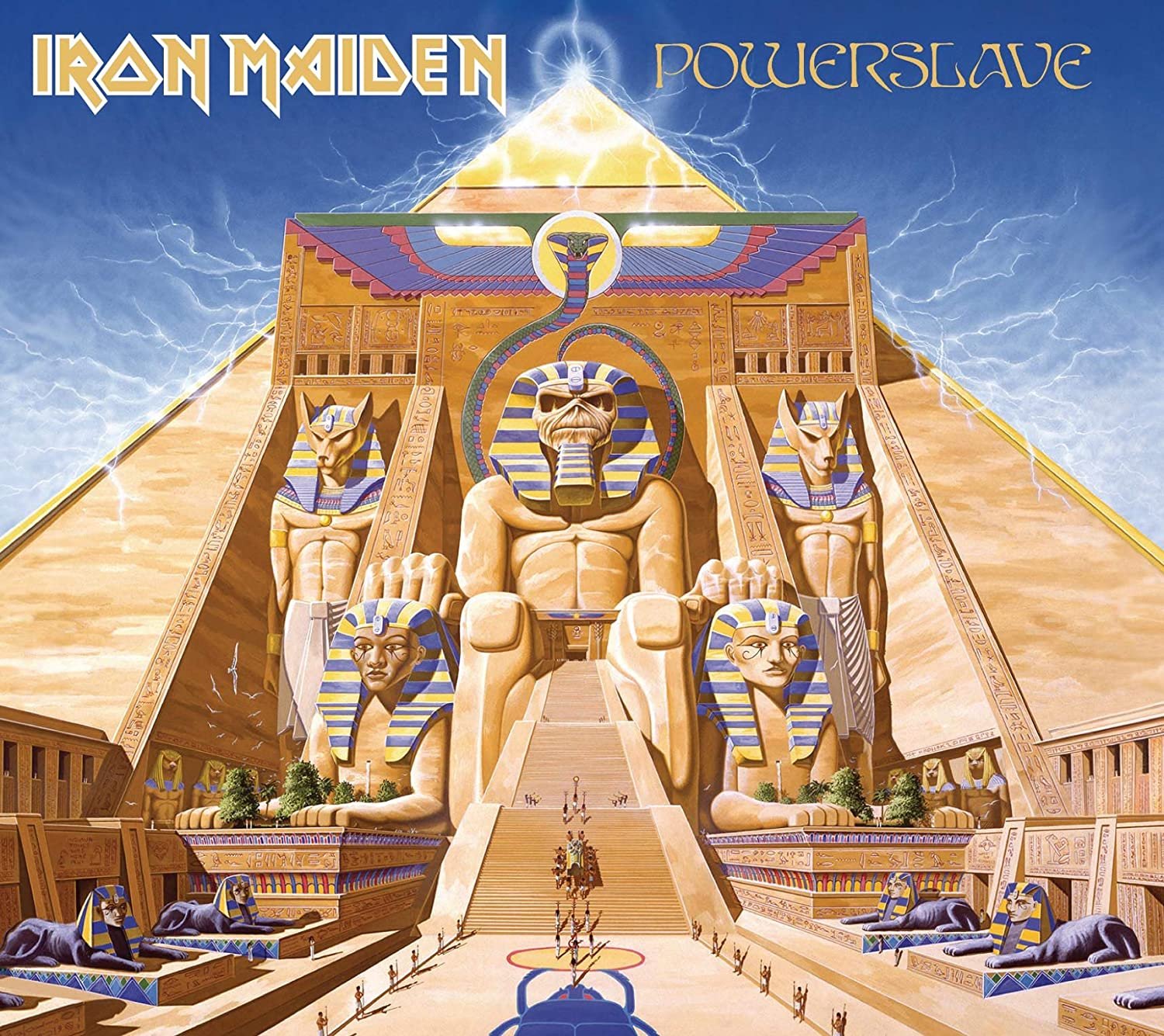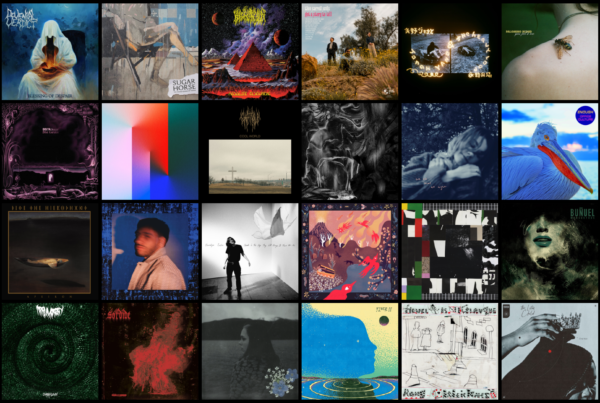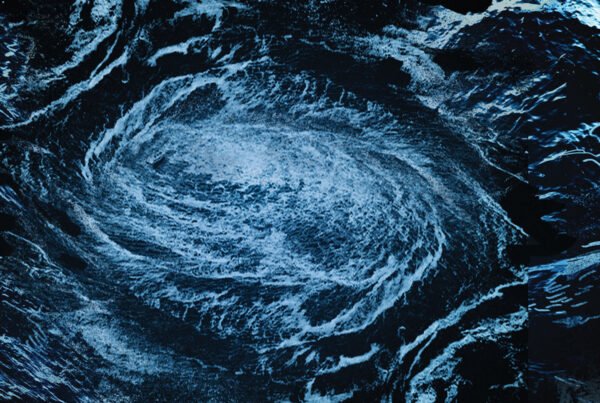At this point, Iron Maiden have settled comfortably into their status as a cult band and legends of the wider metal scene; in 1984, when they released Powerslave, they were still out there laying the foundations for their current acclaim. Truth be told, we could’ve easily included any of their classic records for A Scene In Retrospect, but in the end it was Powerslave that won this particular race. As for why, well, you might want to read on to find out.
Eeli Helin
It was the late summer of 2010, we had just arrived at the gates of Sonisphere festival with my cunt of an uncle, listening the last riff of “Raining Blood” by one Slayer, whose set I missed becausethe said knobhead was adamant that it wouldn’t matter when we’d leave for the fest, for some fucking reason. Anyway. I was there to see Iron Maiden, a band that was a definitive staple in my musical upbringing and growth at the time. We got in, he disappeared to the alcohol/serving area, and I headed out to find a friend of mine with whom we had agreed to catch up with once I arrived. We found each other, exchanged greetings, and then the sky fell on us. Literally.
A thunderstorm of rarely seen proportions swept through the town, hitting the open area at the festival the hardest, after the finnish meteorological institute had issued a dire warning but the officials nationwide gave less than two shits about it. Miraculously, only fourty people got hospitalised, two for severe trauma, with one casualty later on, as the second stage collapsed alongside all food and merch stalls being blown to shit and debris flying about. It lasted for maybe thirty minutes, but felt like an eternity. After the worst had settled, everyone waited for an hour to hear updates about whether or not the whole thing will continue. Iggy Pop came on stage and performed few songs in a man and a guitar manner, and it didn’t exactly help the situation, let alone reassure that better things were on the way. Lo and behold, it was announced that, due to Slayer’s gear being the only band equipment that didn’t get fucked to high heavens, and their willingness to borrow it to both Alice Cooper and Iron Maiden, the event could proceed.
Alice Cooper put on a great show, but again, I wasn’t there for them. Three or four hours later than scheduled, Iron Maiden came on stage, and the following two hours were nothing short of true bliss. Or well, almost.
See, the first album I ever heard from Iron Maiden was, fittingly, Powerslave. I knew and still know the album’s nooks and crannies in, out, and sideways, so of course it holds a special place in my heart. Coupled with the aforementioned importance of the band to me as a whole (as well as seeing them live for the first time), the young me was rather pumped about it. Due to rEaSoNs, however, the band didn’t play a single song off of Powerslave. Not one. While they delivered a hell of a show amidst circumstances unheard of over here, that stung quite a bit. That felt very strange as well, since the likes of “Aces High” and “2 Minutes to Midnight” are the kind of legendary songs that are almost mandatory to play live. The situation got redeemed few years later, though, when the band circled back here and even offered few deep-ish cuts from the album, including the nearly fourteen-minute epic “Rime of the Ancient Mariner”.
I’ve witnessed the band live a few times since, always having wonderful time, and always feeling a certain kind of surge of warmth somewhere deep inside when hearing tracks from Powerslave. The album is also one of the few from Maiden where the less-known songs such as “Flash of the Blade”, “The Duellists”, and “Back in the Village” hit just as hard as the more revered ones. I’ve always enjoyed the themes and aesthetics they dig into on each separate release and song, but on this album they hit the kind of profound cohesion with absolutely everything that’s more or less left unattained on their later efforts.
The band’s longevity underlines its timelessness, and it’s crazy to think that in two years, Powerslave turns fourty-fucking-years old without having aged a day, unlike me and you. I can still lively remember the abiding rush of adrenaline and euphoria I felt when I got back home from the festival at 4AM all those years back, and to this day that sensation has been matched only a few times. I also remember getting in my room, chilly as all hell after being completely soaked and soiled for the past twelve hours, getting under the covers, and putting “Aces High” on from my crappy Mp3 player. I didn’t sleep a second that night, and it didn’t matter. I had just seen Iron Maiden live.
Jake Walters
Hey, we get to write about Powerslave! Iron Maiden are probably one of the most ubiquitous metal bands in the history of this thing that we call pop culture and this by many fans’ estimation their best record. So what’s to say about this record that hasn’t been said? Well, I’ve not written anything about it until now, so let’s get to it! The first thing to say is that I’m not sure which Iron Maiden album is my favorite, but it might well be this one, and for a set of damn good reasons. Powerslave may have given the best 1-2 punch in heavy music history with the first two songs being “Aces High” and “2 Minutes to Midnight”, the latter of which is probably my favorite Maiden song, as I do have a pretty special place for “Fear of the Dark” from the album of the same name. However, “2 Minutes to Midnight” is the song that finds its way into my head more often than not because of that goddamn riff and that chorus. There’s so much tension stretched across that galloping riff and Dickinson’s howl punching the lyrics through those signature riffs is just something that is impossible to overhype.
One doesn’t have to look far at all to find standout moments on Powerslave, as they’re all over this album. “Losfer Words (Big ‘Orra)” the instrumental track in the first third of the record is maybe not the most predictable thing that you would expect from Maiden, but the proof is how great this song is without their hall of fame vocalist lending his pipes here is proof that this band fires on all cylinders. This is also a good time to point out just how great the song titles are on this album a tradition that Iron Maiden carries on so well here and well after. “Flash of the Blade”, while not the strongest song here, has such a catchy, cool title it’s tough not to love it just because of that.
As stated above, Iron Maiden are without a doubt masters of their instruments and songcraft but I would be remiss if I failed to gush about Steve Harris’ bass work on Powerslave. The fact that the bass is so present in the mix certainly helps make his contributions more obvious. I’m not sure if there’s anyone that makes that galloping bass technique work better than Harris and that is employed all over this album, as it stands out on tracks like “The Duelists” when the song finds that groove to sit in while the guitar solos are going off all around it. They just don’t make them like Steve anymore.
While the A side of Powerslave may have a lot of the recognizable hits, side B kicks off with some amazing riffs courtesy of Adrian Smith and Dave Murray on “Back In the Village” while McBrain’s tom fills dress the song up to the point one must wonder why this song isn’t just as popular as “Aces High.” What a tremendous way to kick off the second leg of this record. While this song is great in its own right, the following two songs are just unfairly epic. “Powerslave” and the all-time great “Rime of the Ancient Mariner” close out this record, and man, it’s just almost unfair. If anyone wants to look at how to pace the second half of a record, they need look no further. I think that is what makes Powerslave work so well and be still unmatched in many ways all of these years later. The ability to keep the formula mostly the same from song to song but arrange those wrinkles in ways that make every listen seem like the first is a work of art.
At the end of the day, week, month, and decade, no one is more classic than Iron Maiden and no album holds more weight and nostalgia than Powerslave. There are no weak moments, and while it may not be everyone’s favorite Maiden album, there’s no denying that we wouldn’t be the same people without it. I was lucky enough to see the title track performed live a few years ago, and it was life-affirming stuff that doesn’t come along too often. Fuck yeah, Powerslave.
David Rodriguez
I’ll say it with my chest off rip: Powerslave is Iron Maiden’s best album. Respect to The Number of the Beast, nods to Killers, a hearty hell yeah to Seventh Son of a Seventh Son, and a very underrated handshake to Piece of Mind. None of them are as great as Powerslave.
Why? Well, for one, it’s the absolute apex of Maiden. Not just in quality, but in how the band’s two halves coalesced, though not evenly. Powerslave has the riffs and heavy metal energy that they are absolute legends for, and it’s with that legendary status and obscenely worldwide audience and fanbase that they have, in the last couple decades, shown a more progressive, deliberate, drawn-out side of their work… to varying degrees. This album is where we’re first introduced to that epic Maiden.
Maiden has always lined their songs with larger-than-life stories and themes, but Powerslave’s “Rime of the Ancient Mariner” changed all that. It was 13 minutes and 38 seconds long, based on the longest poem by Samuel Taylor Coleridge. It’s a tale that ultimately culminates in respect for living creatures and letting them lay where they lie after the eponymous mariner kills an albatross, a ‘bird of good omen’. A curse befalls him and his ship’s crew, leading all but the mariner to die in a fateful dice game played by death himself and a ghoulish woman called ‘Night-mare Life-in-Death’. The mariner must see the beauty in life and does so, which grants him a way back home by benevolent spirits. He’s compelled to tell his tale to anyone who would listen, as a warning and implied punishment, ‘To teach God’s word by his own example/That we must love all things that God made’, as the song says.
Iron Maiden adapting a poem like this isn’t the most far-fetched thing they could do – they had dabbled in historical war, mythology, supernatural happenings, and other literature before (“To Tame a Land” from Piece of Mind is about Dune for example). It’s the way they do it that’s impressive. The song plays out in three sections, the lyrics using exact excerpts of the poem and paraphrases to hurry things along (the poem itself is long as hell; over 600 lines organized mostly into four-line stanzas, though sometimes five or six). The music is cinematic, quickened during moments of action or suspense, drenches in gloom and darkness as the climax of the gamble of souls is played, then uplifting as the mariner begins his redemption. It’s a great way to learn about a classic poem, so much so that if I were an English teacher, I would just assign this song rather than the poem itself as an example of adaptation into other media.
This was a turning point for Iron Maiden, or maybe more accurately a prototype of what would come to be modern Maiden music, which is – again, to varying degrees – long and epic in nature, progressive instrumentally and structurally, usually to a fault unfortunately. The average song length for each album even went up after Powerslave, with the exception of No Prayer for the Dying, whose longest song is five-and-a-half minutes. This eased us into new millennium Maiden after Bruce Dickinson rejoined the band, where he apparently just made it his mission to make the longest songs ever for the band. A song under five minutes since Brave New World is a rarity.
But when Iron Maiden isn’t translating epic poems for their music, they’re doing what they do best: being reasonably concise, writing great melodies, and creating timeless classics. Powerslave’s other songs are Maiden to the bone – heavy metal monsters that form the heyday of not only this band, but New Wave of British Heavy Metal and, really, classic metal in general.
“Aces High” is high-octane metal, pulling Immelmann maneuvers in the Battle of Britain during World War II.
‘Move into fire at the mainstream of bombers
Let off a sharp burst and then turn away
Roll over, spin round and come in behind them
Move to their blindsides and firing again
Bandits at eight o’clock move in behind us
Ten ME-109s out of the sun
Ascending and turning our Spitfires to face them
Heading straight for them I press down my guns’
“Flash of the Blade” is a hypnotic tale of a man’s vengeance after his home is burned down and family slain by killers, forcing a boy to grow up fast and train to kill.
‘The smell of resined leather
The steely iron mask
As you cut and thrust and parried
At the fencing master’s call
He taught you all he ever knew
To fear no mortal man
And now you’ll wreak your vengeance
In the screams of evil men’
The title track is one of Maiden’s best, incorporating some light Egyptian/Middle Eastern melodies on guitar to soundtrack a tale of doom and death of a god-pharaoh (also brilliantly covered by Anaal Nathrakh).
‘When I was living this lie, fear was my game
People would worship and fall, drop to their knees
So bring me the blood and red wine for the one to succeed me
For he is a man and a god, and he will die too’
The best song though? “2 Minutes to Midnight”, one of the most perfect metal songs ever written with its earworm guitar melody, anti-war message with some of the most cutting lyrics put to wax, and driving energy that makes it endlessly replayable. I, like most of my generation I would assume, first found this song on Grand Theft Auto: Vice City’s soundtrack – remember the V-Rock radio station?
‘The body bags and little rags of children torn in two
And the jellied brains of those who remain to put the finger right on you
As the madmen play on words and make us all dance to their song
To the tune of starving millions to make a better kind of gun’
The fact of the matter is all Maiden fans are going to have their favorite album, but there’s some sense of objectivity to Powerslave’s superiority. By all means, counterpoint people like me with The Number of the Beast or Somewhere in Time – I get it, I really do. But Powerslave is a synthesis of the band’s best qualities, or the best outcome of their various qualities anyway (one thing a lot of fans do agree on: their last few albums have been mixed at best). This was a time when metal was largely unmatched, creating a blueprint for how the sound is done and endures to this day with several torchbearers, or at least hopefuls, that grew up with Iron Maiden like we did.






